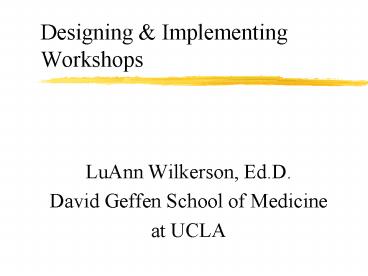Designing - PowerPoint PPT Presentation
1 / 21
Title:
Designing
Description:
Designing & Implementing Workshops LuAnn Wilkerson, Ed.D. David Geffen School of Medicine at UCLA Possible Workshop Outcomes Increased interest in teaching and its ... – PowerPoint PPT presentation
Number of Views:40
Avg rating:3.0/5.0
Title: Designing
1
Designing Implementing Workshops
- LuAnn Wilkerson, Ed.D.
- David Geffen School of Medicine
- at UCLA
2
Possible Workshop Outcomes
- Increased interest in teaching and its
improvement - Changes in knowledge
- Changes in teaching behaviors
- Changes in learner performance
- Improved health outcomes for patients
3
Objectives
- Identify features of workshops associated with
behavior change - Critically assess workshop plans for likelihood
to effect such changes - Identify skills needed by workshop leaders
4
Reflecting ...
- Identify a faculty development workshop in which
you have participated that led you to change a
teaching practice. - What was done in the workshop?
- How long was the workshop?
- Was there a follow-up feature?
5
Have you participated in workshops that included
- Discussion of teaching cases?
- Simulation or role plays with real or
standardized students? - Individualized feedback?
- 2 or more sequenced sessions?
- Follow-up with a reminder system?
- Concurrent learner-mediated training?
6
From CME Interventions that Work
- Multifaceted interventions
- Combining predisposing, enabling, and reinforcing
components - Mixing didactic and interactive methods
- Sequencing of multiple sessions
- Providing application system supports
- Individualized interventions
- Targeted to pre-measures
Davis et al 1992, 1995, 1999
7
From Faculty Development Interventions that Work
- Workshops that are 2 days, involve more than one
intervention, and are followed up with practice
and feedback - Feedback on teaching coupled with expert
consultation - Long-term faculty development fellowships
combining multiple methods
Wilkerson Irby, 1998
8
The Workshop A Chance to Learn from Experience
1. Experience
4. Active experimentation
3. Abstraction generalization
2. Reflection interpretation
Kolb 1971
9
The Challenges
- To create meaningful experiential learning tasks
- To create an environment that supports risk
taking - To facilitate interaction among participants
- To synthesize the lessons learned
10
Case A Workshop Plan
- BUZZ GROUPS
- Form groups of 3-4 persons.
- Introduce yourselves.
- Determine what advice you would give (10 minutes)
- Prepare to report on tip.
11
Planning the Workshop...
Need-based
sequenced
multifaceted
reinforced
learner-mediated
interactive
12
Selecting and Preparing Tasks the
relationship of the total amount of interaction
within a group to achievement differs according
to the nature of the task. E.G. Cohen
Well-structured task Limited exchanges Simple
explanations Routine learning
Complex task Multiple exchanges Extended
elaborations Conceptual learning
13
Beginning the Session
- Set clear expectations
- Provide time for introductions
- Assess readiness or need
- Plan an opening gambit
14
Managing Time
- Estimate time per block
- Introductions
- Experiencial task
- Reflection and discussion
- Generalization
- Experimentation
- Respond to cues about participant readiness
15
Promoting Reflection
- Ask for self-assessment
- Force a commitment
- Explore supporting rationale
- Encourage differences of opinion
- Form relationships generalizations
- Stimulate curiosity
- Listen actively
16
Energizing
17
Abstracting and Generalizing
- Make the discussion visual
- Keep track of key points made
- Provide organizational markers within the
discussion - Link an idea to a person
- Name divergent perspectives
- Reinforce key points
- Provide a visual or verbal summary
- Compare outcomes to intended objectives
18
Providing for Follow-Up
- Provide reminder cards
- Call to discuss subsequent application
- Plan time for discussion of application at the
next workshop - Distribute focused readings or Web resources
- Provide training to learners in the models
promoted in the workshop
19
Avoiding Common Problems
- Defensiveness
- Ineffective tasks
- Not meaningful
- Unclear
- Insufficient control of time
- Overtalking
- Threatening climate
20
The Workshop from Hell, Part 2
- CASE METHOD
- Two perspectives to open
- Facilitator
- Participant
- Problems to be addressed?
- Possible solutions?
21
Readiness Assessment































